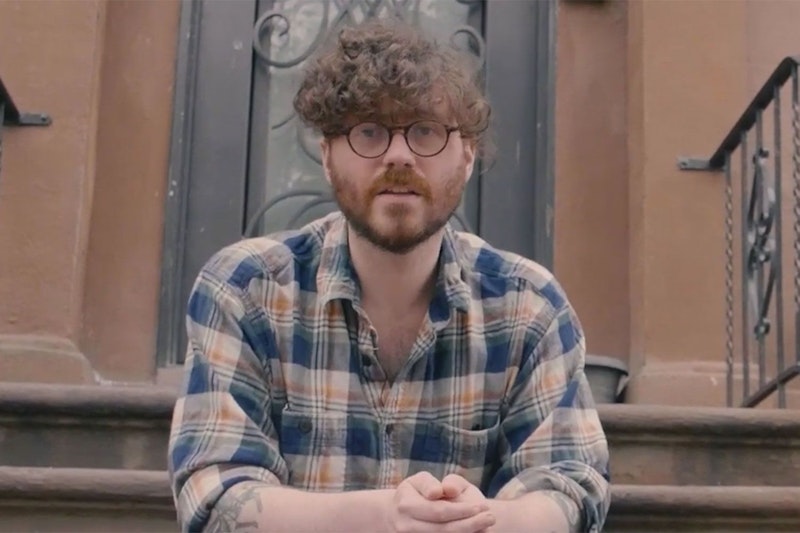In a simple twist of fate, Ryan Carson—described by various mainstream news outlets as a “committed social justice advocate” who “worked tirelessly to better New York City's policies on everything from drug overdoses to recycling”—was fatally stabbed in the early Monday morning hours on Lafayette Ave. and Malcolm X Blvd. in Crown Heights. The 32-year-old had spent the last decade as a campaign manager with the New York Public Interest Research Group and had earned a not inconsiderable reputation among the city’s policymakers and activists.
In the aftermath of Carson's death, the scalding-hot take winds of polarization swept through social media platforms, crystallizing how both sides invested in the narrow spectrum that is American middle-class politics can avail themselves of a single random event as a QED case study to fortify their respective ideological silos. The conversation around Carson's murder morphed into a battleground, with each side interpreting his death as proof of the other's failed policies.
For instance, Nathan J Robinson, founder of the troubled leftist journal Current Affairs, turned to Twitter to argue that Carson’s death was not a result of leftist policy, but a harsh indictment of the fact that progressive policies aimed at providing quality education, housing, food, jobs, and mental healthcare have not yet been implemented.
"The 'urban crime policy' that leftists support is giving every person a good school, good housing, good food, a good job, good mental healthcare, & a supportive, nurturing community," Robinson tweeted. "Are these policies in place? If not, kindly shut up about 'leftists killed by their own policies'."
The argument encapsulates a sentiment embedded among progressives: that a compassionate, comprehensive social welfare system would mitigate the root causes of crime. In a utopian world where these policies were already enacted, proponents believe, the tragic stabbing of someone like Carson might’ve been averted. In fact, New York Assembly Member Emily Gallagher, who knew Carson personally, emphasized that Carson had been a crusader precisely for these kinds of systemic changes, including lobbying for safe injection facilities by walking from New York City to Albany in 2021.
However, a counter-narrative exists, as propounded by right-aligned figures like Kentucky State University professor Wilfred Reilly, author of Hate Crime Hoax, who believes that the soft-on-crime policies favored by left-leaning advocates contribute to incidents like Carson's death.
"I'm not going to laugh or gloat about this, but literally about six prominent leftists have been robbed-on-up this week, due basically to urban crime policies they supported," Reilly tweeted.
The conservative viewpoint posits that lax enforcement and lenient sentencing contribute to a culture of impunity that emboldens criminals. According to this perspective, it’s the very policies championed by people like Carson—sympathetic as he may have been—that create the toxic, urban-jungle conditions that lead to these miserable outcomes. Some might even reasonably claim that Carson’s involvement in initiatives like safe injection facilities reflects a broader philosophy that is too accommodating of antisocial behavior.
The highly charged reactions to Carson's murder are symptomatic of a larger trend in American discourse where stories are handpicked, or even distorted, to confirm pre-existing biases. It's a model of Family Feud virality; the aim isn't to provide nuanced understanding but to echo what audiences assume or want to believe is true. In the void left by Carson’s untimely death, the cacophony of opinions drowns out the nuanced policy conversations, reducing them to sound bites and Twitter wars. Which team are you on? Pick your colors, take it personal, and make it personal—but none of that changes the brute fact that this poor sap is still dead, left to bleed out on the mean streets of New York.
Given that police sources said they don’t have a physical description of the suspect and indicated the individual was acting "irrationally" prior to the attack, the situation strikes a boring normie like me as far too complex to serve as an ideological football. Yet, that's precisely what it has become. As family and friends grieve the death—as should we, for “every man is a piece of the continent, a part of the main”—the reductionist narratives from both sides don't honor the ugly truth of the matter. How does Chandler’s great bit go? “You were dead, you were sleeping the big sleep, you were not bothered by things like that, oil and water were the same as wind and air to you. You just slept the big sleep, not caring about the nastiness of how you died or where you fell.” We mortal men, like the unlucky Carson, will die—which means we could die tomorrow, or even today.
The murder of Ryan Carson reveals more than just the dangers that may lurk on the streets in the early hours; it exposes the perils of a discursive community that can’t help but sacrifice complexity and context at the altar of virality and ideological warfare. He’s deader than dead, he’s got a hole in his guts—but did you win 2000 likes for that tweet? I hope you did; X, formerly Twitter, might pay you for the engagement if you’ve paid for that blue check. I hope it was worth it, because of course it was. That’s the game, and we all play the game. Guess what the followers want to read. Guess the guesses. It was ever thus. How could it be otherwise?

